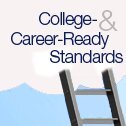Leaders in K-12 and higher education are working together in “unprecedented” ways, but more assistance is needed as states implement new college- and career-readiness standards, new research suggests.
The Southern Regional Education Board just released a series of six reports that analyze the efforts in 14 states to transition to new standards, highlighting states at the forefront in a number of areas. The reports cover accountability, teacher evaluation, alignment of teacher resources, professional development, assessment, and a summary of cross-state findings.

The states included: Alabama, Colorado, Delaware, Georgia, Kentucky, Louisiana, Maryland, Mississippi, New York, North Carolina, Pennsylvania, South Carolina, Tennessee, and West Virginia. All had adopted the new Common Core State Standards. However, six convened formal reviews of the standards, one decided to replace them, and three have undertaken new initiatives to support implementation.
Those involved with the process generally gave the standards good reviews, noting the more they became familiar with them, the more encouraged they felt that they were an improvement over their states’ previous standards, according to SREB.
Describing the scale of the reforms as “massive,” the report called for long-term, comprehensive supports and assistance in the complex transition. While the new standards were being embraced in many states, SREB found that far too many are still not prepared to implement them effectively. Initially, some states had funding to help with collaboration through Race to the Top grants, but now must modify their initiatives as the temporary influx of money ends.
Moving forward, SREB recommends states foster a commitment to policies and funding, strengthen the use of data to guide continuous improvement, and marshal additional staff from state departments of education to address implementation.